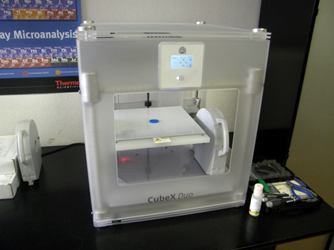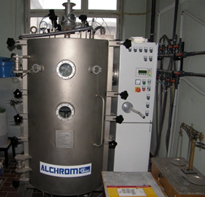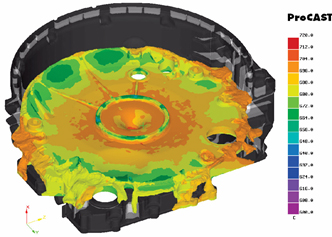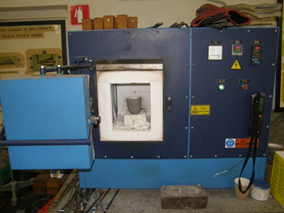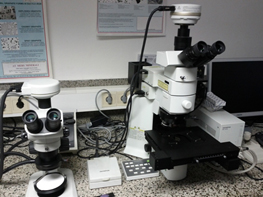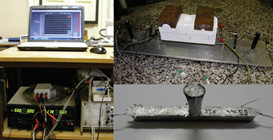Chair of Foundry
HEAD OF CHAIR
Prof. Primož Mrvar, DrSc
Tel: +386 1 2000 447
e-mail:primoz.mrvar@ntf.uni-lj.si
CHAIR ASSOCIATES
Assist. prof. Mitja Petrič, DrSc
Tel: +386 1 2000 428
e-mail:mitja.petric@ntf.uni-lj.si
Tomaž Martinčič, tech. assist.
Tel: + 386 1 2000 439
e-mail:tomaz.martincic@ntf.uni-lj.si
dr. Sebastjan Kastelic, researcher
Tel.: +386 1 2000 426
e-mail:sebastjan.kastelic@ntf.uni-lj.si
Matic Žbontar, young researcher
Tel.: +386 1 2000 426
e-mail:matic.zbontar@ntf.uni-lj.si
The Chair performs basic and applied research and provides courses for the Bachelor study programme in Metallurgical technologies and Master study programme in Materials engineering. The courses we offer are: foundry, foundry technology, casting engineering materials, statistic and quality control.
We have developed strong collaboration with industry and our research is focused mainly on: processes of crystallization and solidification, characterization of foundry alloys, making of new alloys and composites with a metal matrix, research of new control methods (thermal analyses, measurement of oxygen activity in the melt), dilatometric research, recycling of metal materials, modelling materials, numerical modelling of foundry processes, welding and heat treatment.
The chair has four laboratories: Laboratory for research of sand mixtures and fireproof materials, Laboratory for characterization of macro and microstructures, Laboratory for numerical modelling of foundry processes, welding and heat treatment, while the Laboratory for melting is shared with other chairs of the Department.
– Laboratory for research of sand mixtures and fireproof materials
– Laboratory for characterization of macro and microstructures
– Laboratory for numerical modelling of foundry processes, welding and heat treatment
– Laboratory for melting
The Chair of Foundry is the founder of the Slovenian Foundrymen Society. Within this partnership we regularly organize traditional professional meetings in Portorož, which have been going on since 1954. Another joint activity is publishing the journal Livarski vestnik.
http://www.drustvo-livarjev.si/
Every year the Chair of foundry organizes seminars addressing foundry topics, with foreign and domestic participation.
In 2006, the Chair organised a permanent exhibit of donated artistic castings from the collection of Prof. Dr. Milan Trbižan, the former head of the Chair. The collection is divided into nine sections and includes 80 castings, 40 plates and medals and 9 miniature statues of important Slovene figures.
Laboratory for the research of sand mixtures and refractory materials
The laboratory performs research on metal castings and inorganic materials for foundry for industry, scientific purposes and education. Our research is focused on:
– studying foundry alloys: thermal analyses, measurements on oxygen activation in the melt, electro-chemical measurements, temperature measurements, and dilatometric measurements;
– analyses of moulding materials: screening analyses, determination of the specific area of sands, determination of the active clay share by titration with methyl blue, determination of washed particles, mechanical properties of sand mixtures (compressive strength, bending strength, tensile strength, shear strength, split strength), tensile strength of the condensation zone, mouldability of sand mixtures, permeability, compressibility, fluidity, ignition loss, etc.
– coated sand analyses for the Croning procedure: peel back test, tensile strength in hot state, determination of softening point, determination of temperature shock resistance.
The Foundry laboratory is equipped with instruments for:
– thermal analysis: module for aluminium alloys, module for ferrous alloys
– oxygen probe for measuring oxygen activity in ferrous alloys
– “In-situ” dilatometer
– gassing determination
– high temperature electrical furnace (Tmax 1800 °C)
– Simpson mixer for preparation of sand mixtures
– a complete equipment for determination and characterization of sand mixtures (+GF+)
– shot blasting equipment for making samples from a sand mixture
– hot distortion tester for determination of gas pressure
Laboratory for characterization of macro and microstructures
The laboratory is capable to perform characterization or macro and microstructures of castings. The laboratory is equipped with a powerful system for image analysis (Materials research lab, producer Analysis). The system allows macroscopic investigation of casting defects like: shrinkage and gas porosity, cracks, inclusions, etc; as well as microscopic investigations and analyses in light and dark field, in polarized light, and with interferential contrast.
The laboratory is equipped with the following Olimpus instruments:
– Instrument for macro images
– Stereo microscope
– Metallographic microscope
Laboratory for numerical modelling of foundry processes, welding and heat treatment
Laboratory equipment:
ProCAST and QuikCAST programs for numerical modelling of foundry processes:
ProCAST and QuikCAST programs enable analyses of all foundry processes by finite element or finite difference methods. From the data calculated we can analyse temperature field during filling and solidification of a casting in the mould. In addition to temperature analyses, we can also analyse defects, stresses and deformations in castings.
SYSWELD program for numerical modelling of welding and heat treatment processes:
By SYSWELD program, we can analyse welding and heat treatment process by finite element method. From calculating data, we can analyse temperature field and gradient, deformation during and after welding, stresses and microstructure.
Laboratory for melting
The laboratory is equipped with different instruments:
1. Vacuum induction casting furnace
All processes, from preparation, melting, purring and cooling are made in a vacuum or in a controlled atmosphere.
Specifications:
– Power: max 45kW
– Frequency: 1 – 5 kHz
– Vacuum: 10-3 mbar
– Volume: 2,5 L
– Max. temperature: 2000 °C
The furnace is suitable for synthesis and casting of various materials in vacuum or protective atmosphere.
With new experimental computer regulated furnace we can perform:
– Gravity casting in permanent moulds
– Gravity casting in unique forms made from different fireproof materials
– Centrifugal casting in shells (investment casting) and permanent moulds
– The furnace can be used for directional solidification.
2. “In situ” microstructure control with solidification monitoring by dilatometric and thermal analysis. For solidification monitoring, we developed and verified a new dilatometric and thermal analysis “in situ” method, which can reliably and precisely identify solidification for all foundry alloys.
3. Solidification and microstructure control of castings with “in situ” conical probe. For solidification monitoring and microstructure formation, we developed a conical measurement cell for “in situ” simple thermal analysis.
